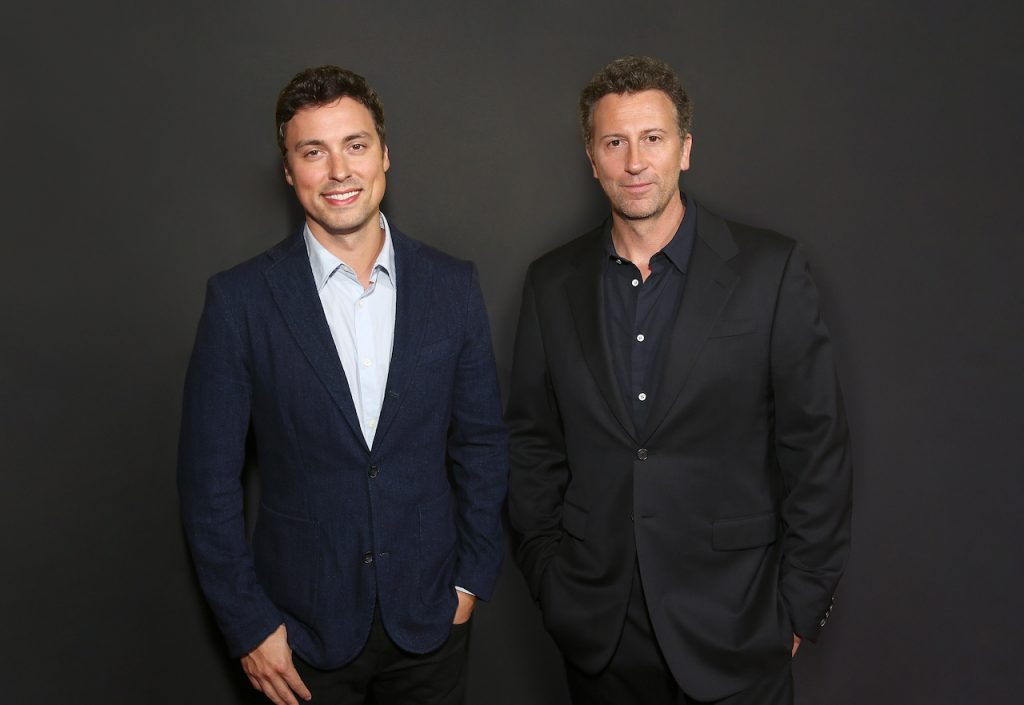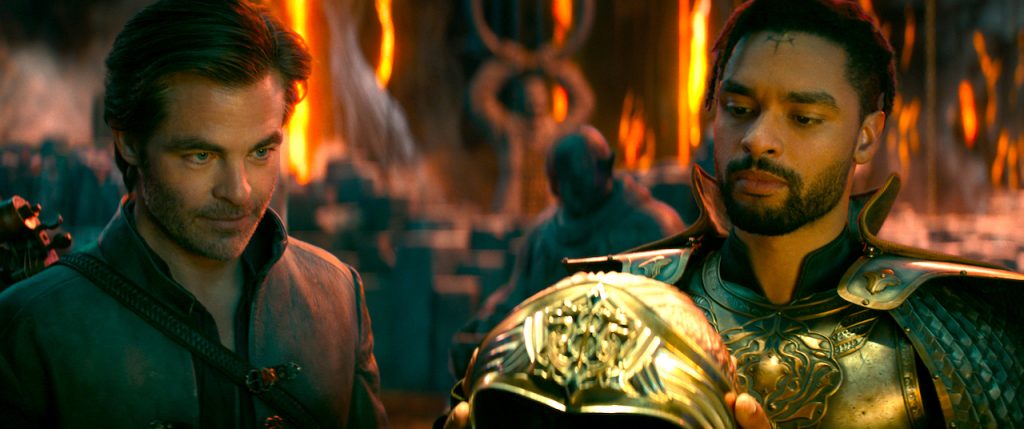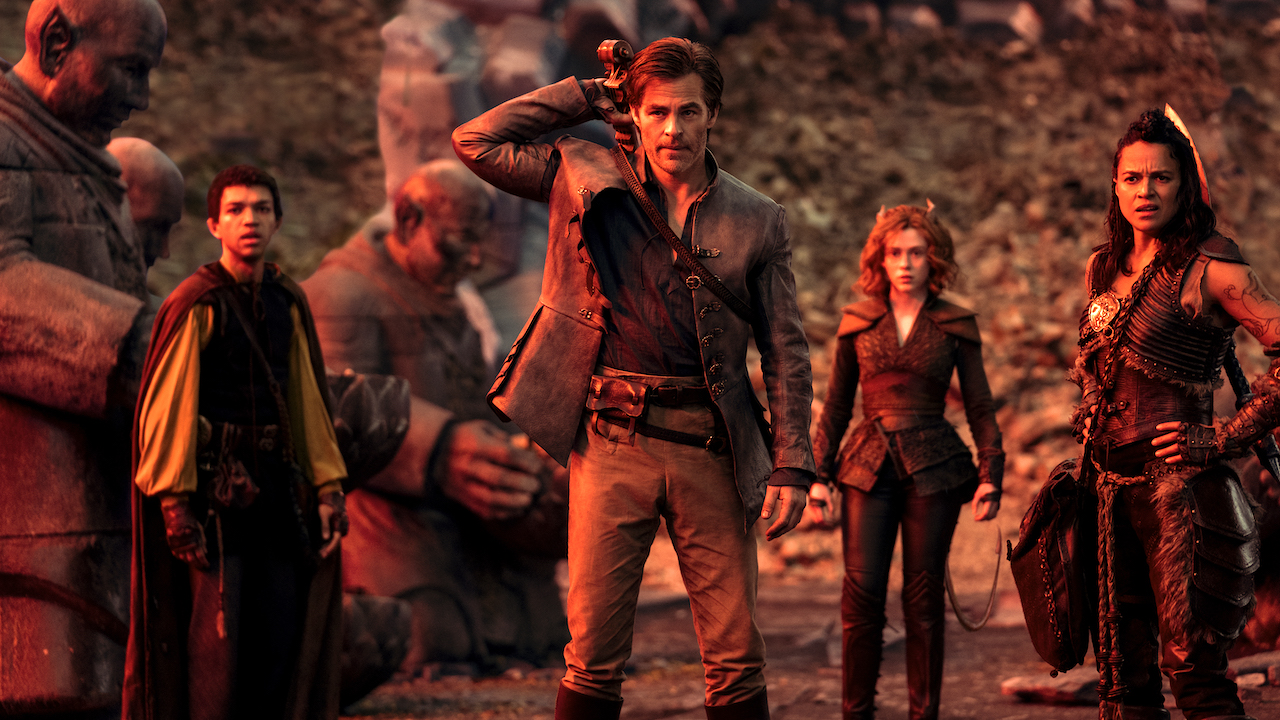The impact of games as source material for movies show no signs of slowing down. Dungeons & Dragons: Honor Among Thieves written and directed by John Francis Daley and Jonathan Goldstein (Horrible Bosses) confirms that audiences still have an appetite for a rollicking heist adventure, and that studios still want to make these films. Daley and Goldstein sat down with Creative Screenwriting Magazine to discuss bringing HASBRO’s “build your own adventure role-play” game, in which no two games play out exactly alike, to the screen.
They approached the adaptation more from a place of fun than fidelity to the game. “The intention for us was not to adapt any one story, but to adapt the world and the sensibility of the Dungeons & Dragons game when you play it,” says Daley.”This is very different from anything else in the fantasy film space.” The world is populated by creatures, magical spells, and locations. “These are sometimes absurd. There is also this sense of levity and whimsy,” he continues.
Jonathan Goldstein prefers to start the adaptation from the characters. “This is where you start when you play the game Dungeons & Dragons. You create your own characters. Each has varying skills, some strengths, and some weaknesses.” The hope is that audience invests in seeing them overcome these obstacles and grow during the course of the film.
Dungeons And Dragons had an almost decade-long gestation period before eventually making it to the screen. Michael Gilio wrote an early draft of the screenplay which Daley and Goldstein never read. However, the heist spirit of Gilio’s draft in the current film, still remains. “It was a fun gateway into the world,” says Daley. “Another vestige of Gilio’s draft is the ‘speak to the dead’ sequence. We loved the idea of telling a story through flashbacks.”
John Francis Daley and Jonathan Goldstein are cognizant that big action films must appeal to the broadest audience possible to be commercially viable. “You have to have a certain amount of simple fun and visual popcorn spectacle. But you don’t want that to be the hinge point of your script. You just wanna make sure you’ve peppered it through enough so that the audience is always engaged and surprised in having a fun ride,” adds Goldstein.
“That said, you can add a lot of importance to those sequences so they aren’t just surface level by having them be pertinent to the story and developing where our characters end up going. So, we treated each of those sequences like the carriage heist, where they have to sneak a portal onto a carriage as a puzzle that we build, and then ultimately have to solve,” states Daley.
“And we wanted to make sure that each of our main ensemble has an arc and a story of their own that’s separate from their own journey as an ensemble. When you have four characters, not everyone’s going to have as much screen time as everyone else. But I think we did succeed in giving each of them an arc and a payoff and a conclusion.”
The Importance Of The Opening Scene
The edge-of-your-seat, adrenaline-pumping opening parole board hearing sequence of Dungeons And Dragons was arguably the most important to write for the audience to get onboard with the conceit of the film, and stay on board before the opening credits roll. “We knew that we had to get across a good deal of backstory and exposition in the opening that felt organic,” states Goldstein. They wanted to avoid an exposition dump. The writers made the parole hearing both funny and sad to wink to the audience.
“Before that parole hearing scene, there is a scene that’s very different tonally from what the rest of the film is, where we are first introduced to this world in this somber light that is more evocative of Game of Thrones or The Witcher,” says Daley. The initial darker tone misleads the audiences before subverting their expectations until we meet Edgin (Chris Pine) and Holga (Michelle Rodriguez).
Aside from the HASBRO game, the Dungeons And Dragons movie was inspired by Oceans’ Eleven, “since that too is a heist film that starts with Danny Ocean in prison. And we love the idea of a parole hearing, being the way to establish his backstory that felt natural and not like we were forcing it down people’s throats,” continues Daley. A key aim was to provide as much backstory with emotional stakes.
“Even though you’re new to the movie, you’re new to these people, you’re not that invested yet, but you’re laying the groundwork for what hopefully is an emotional connection to your characters,” adds Goldstein.

John Francis Daley & Jonathan Goldstein. Photo by Jesse Grant/ Getty Images
“Backstory is not just information, but more like, ‘That experience must have really messed him up. That must have been hard to live through,’” declares Goldstein.
Backstory is emotional information, not just story information
John Francis Daley & Jonathan Goldstein walked the narrow tightrope of appealing to diehard gamers versus audiences not familiar or even interested in the game. They even tossed in some breadcrumbs from the game like Baldur’s Gate and Waterdeep.
“We had an unspoken rule that if you needed to have read about something before you hear it in the movie to understand it, we wouldn’t use it. It had to be things that the casual viewer who may not even like fantasy films, let alone Dungeons & Dragons, can understand it and follow it,” asserts Goldstein.
John Francis Daley likens it shop talk in TV shows like The Wire. “You don’t know exactly what they’re saying, but you know the intention behind it, and that actually adds to the authenticity because you don’t fully know what they’re speaking so confidently about.”
Building The World Of Dungeons And Dragons: Honor Among Thieves
“What’s so fun about Dungeons & Dragons is there’s always a macabre and bizarre twist on conventional creatures and monsters. For instance, the mimic. You’re never going to see something like that in Lord of the Rings,” declares Daley.
“That blend of the absurd and the terrifying is something that we definitely leaned into, especially with Thembershot, our Dragon, where you can laugh at the physical absurdity of him, but he’s also incredibly dangerous and scary.”
Jonathan Goldstein likens it “to the Star Wars cantina where you go in and there are all these bizarro aliens. You could follow any of them to their home planet and there’d be a million stories to tell. We understand that we’re in a larger world. That’s the feeling we wanted to create. That the world felt lived in.”
Aside from the thrills and spills in Dungeons And Dragons: Honor Among Thieves, there are many impactful themes to examine. “One is the notion of found family, not necessarily the family you’re born into, but how you make you make your family as you go through your life,” says Goldstein.

Edgin (Chris Pine) & Xenk (Regé-Jean Page) Photo courtesy of Paramount Pictures
“And the other is failure and how you handle that and how you use it to make you stronger and keep pushing forward, because the only time you truly fail is when you stop trying.”
Both game and movie versions of Dungeons And Dragons rely on magic and sorcery – with restrictions and drawbacks. “We made sure to give each of our magic users limits because generally magic can be overused in a way that becomes cinematically boring,” states Daley.
“Magic is often just visually depicted as beams of energy exploding from people’s hands or wands, and we loved giving it a more tactile, authentic, and legitimate approach,” he adds.
“Every spell that Simon summons has this material, somatic, or verbal component to it, which is all in keeping with the rules of the game, which to us provided this sense of realism that differentiates it from the depiction of magic in other fantasy films.”
Jonathan Goldstein started off as a sitcom writer which often relies on people not being able to communicate to make them funny. An example would be the lack of cell phone reception or a flat battery at the worst possible moment. These scenarios create complications. “Magic has a similar role. It can fix things too easily, so there have to be limits to them.”
In terms of creative influences, Daley and Goldstein are self-confessed Tokien fans – they LOVE Lord Of The Rings. “Curiously, I think we were more inspired by adventures that don’t necessarily fit in that genre, like Indiana Jones, Jurassic Park, and Star Wars… these big world-building concepts that are unified in the sense that they have these imperfect heroes at the center of them. People that need to learn something, And the world surrounding them is more peripheral… less to do with the story than what their characters are having to face personally,” elaborates Daley.
Goldstein says of the energy of the movie, “I think it’s a non-cynical movie with a really hopeful message. Our hope was to make a movie that allows you to escape from your real life for a couple of hours, that immerses you in a world of challenging things much bigger than anything most of us face in the real world, but with characters who are relatable and who we recognize ourselves in.” This message of hope in the face of obstacles is something the writers connected with from the films of their childhoods.
The Characters
“Simon (Justice Smith) represents confidence, or his lack thereof, at the beginning of the film that he has to overcome,” says Daley.
“Holga represents a sense of strength, but not being able to face the weakness that she feels inside of herself. She has an almost imposter syndrome that she has after her being a reject from her tribe.”
“Edgin represents this eternal optimism, but also stubbornness to get what he wants and never stop or accept the fact that sometimes we fail. Sometimes we don’t get what we want and that can be okay too.”
“Doric (Sophia Lillis) has this somewhat anti-social personality where she’s burdened by her past and her dealings with humans. She has to overcome those biases to realize that just because there were two people that did her wrong, it doesn’t mean that all people are wrong.”
“Xenk (Regé-Jean Page) is perfect in every way, except he has no sense of humor, so I can really relate to that guy,” jokes Daley.
The main characters have their individual characteristics, but they also interact among themselves. “Edgin and Holga have a platonic brother/sister partnership. He’s the planner, she’s the muscle, and they really do complement each other in that sense,” says Goldstein. Holga acts on the go.
“Simon suffers from a bit of self-loathing, but he is actually quite a powerful sorcerer. He just doesn’t know it yet. If Edgin and Holga are the mom and dad, Simon’s the troubled son. Doric is the surly teenager.”
Daley’s favorite relationship is that between Xenk and Edgin. “Edgin always fancies himself the leader. Xenk is a legitimate leader who is literally better than him at everything except self-awareness. I just love seeing a guy who thinks he knows everything suddenly feel threatened by that.“
